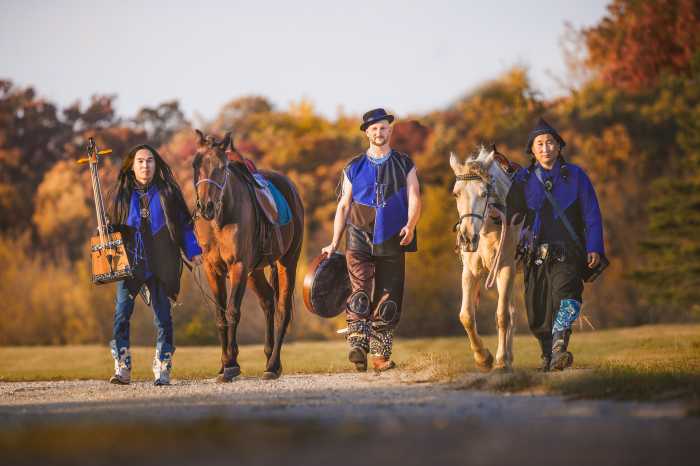“I heard the first Beatles record and I was lost forever,” said Pat Irwin.
The Long Island City based musician, once christened “a mercurial presence on the New York rock scene in the early 80s,” by the New York Time’s Robert Palmer, graced some of the forefront acts of the No Wave movement – a post-punk genre with hints of avant garde — founding The Raybeats and 8-Eyed Spy before joining the B-52s in 1989. More recently, Irwin is the genius behind soundtracks for HBO’s “Bored to Death” and Showtime’s “Nurse Jackie.”
During Iriwn’s early days on the music front in the late 70s and early 80s – an era when the city seemed to dip into obscurity – subversive art forms hit a stride.
“For as dark as that music was, the scene was very dark and Manhattan was rough,” said Irwin. “But it was violent and bright and there were musicians and painters and lines were blurring in places you could play.”
 The Raybeats played shows at now-defunct downtown joints like The Mudd Club and Tier 3. It was an indie, marginal scene, defined by home-burned 45s given to bar owners in exchange for dinner and advertising for gigs by spray painting the information on a wall. Publications like The Soho Daily News and The New York Rocker illustrated which hip British band was landing on stage at the venue across the alley from your apartment.
The Raybeats played shows at now-defunct downtown joints like The Mudd Club and Tier 3. It was an indie, marginal scene, defined by home-burned 45s given to bar owners in exchange for dinner and advertising for gigs by spray painting the information on a wall. Publications like The Soho Daily News and The New York Rocker illustrated which hip British band was landing on stage at the venue across the alley from your apartment.
“Things were all mixed up in a pretty great way,” said Irwin. “Filmmakers made movies that changed movies. It was an exciting time to be here. We’re kind of lucky to be alive. It was a dangerous time in New York.”
Remembering the acts that appeared on the “No New York” album, Irwin said, there’s a lot of people who didn’t survive.
“No New York” – the Brian Eno-produced No Wave auditory bible – served as Irwin’s amuse bouche into the world of underground music. Irwin said the album was more of an experience rather than an influence.
“I was there,” Irwin said. “I remember the studio. That was an amazing time.”
But Irwin’s musical upbringing began far from the concrete labyrinth of New York City in a smattering of Mid-Western states where he learned to play the piano and the guitar. As a kid, he snuck into see “Goldfinger” against his parents’ wishes. He found the soundtrack hypnotic, indicating the impetus into what would become Rock and Roll’s metamorphosis — the genre ceasing to be just Pop music as it permeated the consciousness of mainstream America, changing the way people dressed, wore their hair and even shopped.
“I love music, so [influence] is going to come from anywhere, anytime, anyplace,” said Irwin. “And it can come from jazz or classical music or a painting.”
Irwin indicated the music created in New York just before him — The Talking Heads, Blondie, Patti Smith and Iggy Pop – as major, musical influences. However, it was the independent spirit of the Ramones and punk music’s inauguration in the United States that took music to another place for Irwin.
“I listen to some of those recordings and I still get thrilled,” said Irwin.
Irwin joined the B-52s in 1989 after guitarist Ricky Wilson died of an AIDS-related illness. The band ran in the same scene as Irwin for most of the 80s, even borrowing one of his amps for a show and teaming up for gigs with The Raybeats. After Wilson passed away, Irwin said the band members, at the cusp of recording a new record, were despondent. Enlisting Irwin and Gang of Four’s Sara Lee, the newly designed B-52s set out to make what would be one of their biggest hits – “Love Shack.”
After filming the video for “Love Shack,” – perfectly apt with the zenith of MTV — the group set out on an international tour, beginning at CBGB’s in New York. By the time they reached the West Coast, they played the Greek Theatre – one of Los Angeles’ main venues.
“We got really big,” Irwin said, pointing to a photograph of the crowd from their show in Central Park, the lawn covered entirely with fans. “We blinked and that became a huge record.”
Irwin said seeing the crowd in Central Park “his moment.” Later that evening, they played as the musical guest on Saturday Night Live. The underground, post-punk band with avant garde roots and sudden mainstream success, evolved.
“That’s one of the problems with a lot of popular music,” said Irwin. “When you make that kind of music you get calcified if you’re not careful.”
He said the band still plays “Rock Lobster” every night.
After 19 years with the B-52s, Irwin bitter-sweetly set off on a separate musical trajectory.
“It was a thrill for me to play with the B’s,” he said. “I was a fan. Still am.”
Irwin composed soundtracks for movies and cartoons, including the Generation X theme song from “Rocko’s Modern Life.” One of Irwin’s favorite past musical projects, composing for “Rocko” was “like being in an engine.”
“It was so liberating,” said Irwin. “We would just go into the studio and fly — I love what I get to do when I work on a cartoon. I get to make a new record every time.”


































